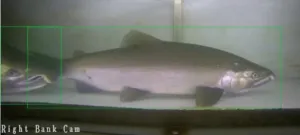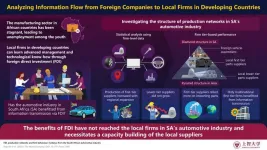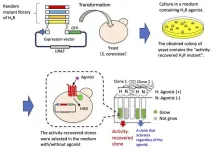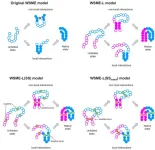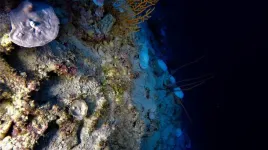(Press-News.org) Scientists and natural resource managers from Canadian First Nations, governments, academic institutions, and conservation organizations published the first results of a unique salmon population monitoring tool in Frontiers in Marine Science. This groundbreaking new technology, dubbed “Salmon Vision,” combines artificial intelligence with age-old fishing weir technology. Early assessments show it to be remarkably adept at identifying and counting fish species, potentially enabling real-time salmon population monitoring for fisheries managers.
“In recent years, we’ve seen the promise of underwater video technology to help us literally see salmon return to rivers,” says lead author Dr. Will Atlas, Senior Watershed Scientist with the Portland-based Wild Salmon Center. “That dovetails with what many of our First Nations partners are telling us: that we need to automate fish counting to make informed decisions while salmon are still running.”
The Salmon Vision pilot study annotates more than 500,000 individual video frames captured at two Indigenous-run fish counting weirs on the Kitwanga and Bear Rivers of B.C.’s Central Coast.
The first-of-its-kind deep learning computer model, developed in data partnership with the Gitanyow Fisheries Authority and Skeena Fisheries Commission, shows promising accuracy in identifying salmon species. It yielded mean average precision rates of 67.6 percent in tracking 12 different fish species passing through custom fish-counting boxes at the two weirs, with scores surpassing 90 and 80 percent for coho and sockeye salmon: two of the principal fish species targeted by First Nations, commercial, and recreational fishers.
“When we envisioned providing fast grants for projects focused on Indigenous futurism and climate resilience, this is the type of project that we hoped would come our way,” says Dr. Keolu Fox, a professor at the University of California-San Diego, and one of several reviewers in an early crowdfunding round for the development of Salmon Vision.
Collaborators on the model, funded by the British Columbia Salmon Recovery and Innovation Fund, include researchers and fisheries managers with Simon Fraser University and Douglas College computing sciences, the Pacific Salmon Foundation, Gitanyow Fisheries Authority, and the Skeena Fisheries Commission. Following these exciting early results, the next step is to expand the model with partner First Nations into a half-dozen new watersheds on B.C.’s North and Central Coast.
Real-time data on salmon returns is critical on several fronts. According to Dr. Atlas, many fisheries in British Columbia have been data-poor for decades. That leaves fisheries managers to base harvest numbers on early-season catch data, rather than the true number of salmon returning. Meanwhile, changing weather patterns, stream flows, and ocean conditions are creating more variable salmon returns: uncertainty that compounds the ongoing risks of overfishing already-vulnerable populations.
“Without real-time data on salmon returns, it’s extremely difficult to build climate-smart, responsive fisheries,” says Dr. Atlas. “Salmon Vision data collection and analysis can fill that information gap.”
It’s a tool that he says will be invaluable to First Nation fisheries managers and other organizations both at the decision-making table—in providing better information to manage conservation risks and fishing opportunities—and in remote rivers across salmon country, where on-the-ground data collection is challenging and costly.
The Salmon Vision team is implementing automated counting on a trial basis in several rivers around the B.C. North and Central Coasts in 2023. The goal is to provide reliable real-time count data by 2024.
END
First Nations-led A.I. technology holds promise for salmon recovery
Right now, fisheries managers in British Columbia and beyond can’t track salmon returns in real-time. “Salmon Vision” could change that
2023-10-19
ELSE PRESS RELEASES FROM THIS DATE:
The role of supply chain in knowledge transfer: a case study of South African automotive industry
2023-10-19
Unemployment among the youth is a serious problem in many developing countries, especially in Africa. This issue stems in great part from a stagnant manufacturing sector. Firms in African countries have failed to grow significantly over the past decade, leading to fewer job positions for the youth.
Foreign direct investment (FDI) is a promising avenue for addressing this challenge. Local firms in developing countries can learn advanced technologies and management strategies from multinational companies. This transmission of knowledge, in general, helps make ...
Restoring the function of a human cell surface protein in yeast cells
2023-10-19
G protein-coupled receptors (GPCRs) are the largest and most diverse group of cell surface proteins in humans. These receptors, which can be seen as ‘traffic directors,’ transmit signals from the outside to the inside of cells and are involved in many physiological processes. Given their prominent roles in cellular communication, cell growth, immune responses, and sensory perception, many drugs have been developed to target GPCRs, for the treatment of conditions such as asthma, allergies, depression, hypertension, and heart disease. In fact, more than 300 GPCR-related drugs are currently in clinical trials, 36% ...
Physical theory improves protein folding prediction
2023-10-19
Proteins are important molecules that perform a variety of functions essential to life. To function properly, many proteins must fold into specific structures. However, the way proteins fold into specific structures is still largely unknown. Researchers from the University of Tokyo developed a novel physical theory that can accurately predict how proteins fold. Their model can predict things previous models cannot. Improved knowledge of protein folding could offer huge benefits to medical research, as well as to various industrial processes.
You are literally made of proteins. These chainlike molecules, made from tens to thousands of smaller molecules called amino acids, form things like hair, ...
Persistently high rates of severe maternal trauma during forceps, vacuum births warrant national response, analysis shows
2023-10-19
A McMaster University-led analysis published in the BMJ on Oct. 19, exposes high rates of injuries with forceps and vacuum delivery in Canada that have been documented for over a decade without efforts to address them.
The paper, titled Maternal and neonatal trauma during forceps and vacuum delivery must not be overlooked, was authored by perinatal epidemiologists, obstetricians, urogynecologists, community advocates and patient partners, and calls for increased recognition, transparency and action to prevent these injuries.
As part of the analysis, researchers present data from the Organisation for Economic Co-operation ...
Canadians with peptic ulcer disease faced mental health challenges during COVID-19 pandemic
2023-10-19
Toronto, ON — New research from the University of Toronto has revealed the mental health toll of the COVID-19 pandemic on older adults with peptic ulcer disease (PUD), a painful condition in which gastric sores develop in the lining of the stomach or upper portion of the small intestine.
The researchers examined a subsample of older adults from the Canadian Longitudinal Study on Aging, a national dataset of older Canadians. The sample consisted of 1,140 older adults with PUD, of whom 689 had a pre-pandemic history of depression and 451 had no history of depression. By using longitudinal data, the researchers were ...
Red meat consumption associated with increased type 2 diabetes risk
2023-10-19
Key takeaways:
Eating more than one weekly serving of red meat may raise type 2 diabetes risk.
Replacing red meat with plant-based protein sources, such as nuts and legumes, may reduce risk of type 2 diabetes.
Embargoed for release: Thursday, October 19, 4:00 AM ET
Boston, MA — People who eat just two servings of red meat per week may have an increased risk of developing type 2 diabetes compared to people who eat fewer servings, and the risk increases with greater consumption, according to a new study led by researchers from Harvard T.H. ...
Grouping English learners in classrooms yields no benefit in reading development, new study finds
2023-10-19
Grouping English learners together in classrooms, a longstanding practice in schools, has no impact—positive or negative—on reading development for elementary school students, shows a new study by a team of literacy education researchers.
“When I taught middle school 20 years ago, I noticed that my English learner students were separated from their native English-speaking peers all day long,” says NYU Steinhardt associate professor Michael Kieffer, the study’s lead author. “Data show that this practice continues in many places today, ...
The addition of a dedicated nursing team to assist with catheter insertions can help reduce bloodstream infections in hospitals
2023-10-19
Arlington, Va. — October 19, 2023 — A new report published today in the American Journal of Infection Control (AJIC) demonstrates that implementing a dedicated team of nurses to assist with central line insertions can reduce patients’ risk of developing bloodstream infections due to those central lines. In this report, infection preventionists at UNC Health found that having this dedicated team reduced the proportion of central line-associated bloodstream infections occurring within ...
Scientists discover deepest known evidence of coral reef bleaching
2023-10-19
Scientists have discovered the deepest known evidence of coral reef bleaching, more than 90 metres below the surface of the Indian Ocean.
The damage – attributed to a 30% rise in sea temperatures caused by the Indian Ocean dipole – harmed up to 80% of the reefs in certain parts of the seabed, at depths previously thought to be resilient to ocean warming.
However, scientists say it serves as a stark warning of the harm caused in our ocean by rising ocean temperatures, and also of the hidden damage being caused throughout the natural world as a result of climate change.
The findings, highlighted in a study published ...
Holy bat skull! Fossil adds vital piece to bat evolution puzzle
2023-10-19
Of all the mammals, bats have one of the poorest fossil records, with palaeontologists estimating that about 80 per cent of it is missing.
This has made it difficult to pinpoint exactly when they first began to fly, or began roosting in caves, or developed their unique way of ‘seeing’ their surroundings in the dark using sound – called echolocation.
But a near-perfectly preserved bat’s skull discovered by French palaeontologists in a cave that dates back about 50 million years has shed new light on what we thought we knew about this ancient, ...
LAST 30 PRESS RELEASES:
Putting some ‘muscle’ into material design
House fires release harmful compounds into the air
Novel structural insights into Phytophthora effectors challenge long-held assumptions in plant pathology
Q&A: Researchers discuss potential solutions for the feedback loop affecting scientific publishing
A new ecological model highlights how fluctuating environments push microbes to work together
Chapman University researcher warns of structural risks at Grand Renaissance Dam putting property and lives in danger
Courtship is complicated, even in fruit flies
Columbia announces ARPA-H contract to advance science of healthy aging
New NYUAD study reveals hidden stress facing coral reef fish in the Arabian Gulf
36 months later: Distance learning in the wake of COVID-19
Blaming beavers for flood damage is bad policy and bad science, Concordia research shows
The new ‘forever’ contaminant? SFU study raises alarm on marine fiberglass pollution
Shorter early-life telomere length as a predictor of survival
Why do female caribou have antlers?
How studying yeast in the gut could lead to new, better drugs
Chemists thought phosphorus had shown all its cards. It surprised them with a new move
A feedback loop of rising submissions and overburdened peer reviewers threatens the peer review system of the scientific literature
Rediscovered music may never sound the same twice, according to new Surrey study
Ochsner Baton Rouge expands specialty physicians and providers at area clinics and O’Neal hospital
New strategies aim at HIV’s last strongholds
Ambitious climate policy ensures reduction of CO2 emissions
Frontiers in Science Deep Dive webinar series: How bacteria can reclaim lost energy, nutrients, and clean water from wastewater
UMaine researcher develops model to protect freshwater fish worldwide from extinction
Illinois and UChicago physicists develop a new method to measure the expansion rate of the universe
Pathway to residency program helps kids and the pediatrician shortage
How the color of a theater affects sound perception
Ensuring smartphones have not been tampered with
Overdiagnosis of papillary thyroid cancer
Association of dual eligibility and medicare type with quality of postacute care after stroke
Shine a light, build a crystal
[Press-News.org] First Nations-led A.I. technology holds promise for salmon recoveryRight now, fisheries managers in British Columbia and beyond can’t track salmon returns in real-time. “Salmon Vision” could change that
